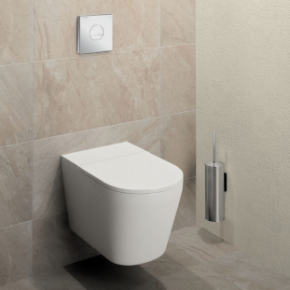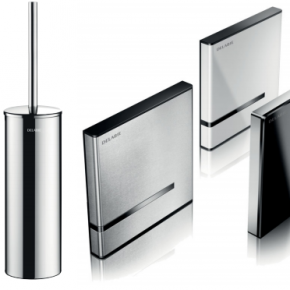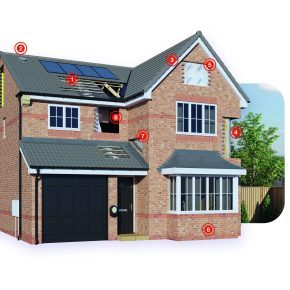
ABC&D ARTICLE: Specifying washrooms for the high street
Water controls and sanitaryware manufacturer, DELABIE, looks at how to extend the life of public and commercial bathrooms through considered specification, in August’s edition of ABC&D magazine…
Every high street location patronised by the public potentially needs to offer washroom facilities for its customers, especially as council-funded town centre toilets succumb to budgetary pressures.
Usually, small-scale business owners tend to refurbish every 15 to 20 years, relying on local expertise for design, installation, servicing and maintenance. Domestic taps and WCs are often installed through habit.
However, they are not always fit for purpose. These destinations – cafés, bars and restaurants, doctor’s surgeries and even hairdressers – face the same constraints as larger facilities: intensive use, vandalism, water saving, hygiene and ease of installation and maintenance.
Catering for intensive use
Toilets in cafés or doctor’s surgeries need to withstand intensive use. Domestic taps and WCs have fragile components that wear out quickly, leading to leaks and broken mechanisms.
To withstand repeated use, mechanisms should be made from durable materials.
Involuntary vandalism
Domestic taps cannot withstand unintentional or deliberate vandalism.
Low flow rates and an ineffective toilet flush can lead to frustration and heavy-handed behaviour. Not only must the bodies and mechanisms be robust, but fixings should be secure and, ideally, concealed from the user.
Specifying taps and flush valves with recessed mechanisms will prevent deliberate abuse since users cannot access sensitive components.
Accessories also need to withstand knocks and even light-fingered users. Soap dispensers and toilet roll holders with one-piece integrated covers prevent user access to the contents while secure fixings discourage unwanted removal.
Simply matching the finish on the taps and sanitaryware to the soap dispenser and toilet brush will improve washroom aesthetics and engender respect in users.

Reducing consumption
Away from home, users have no responsibility for the water or energy bills and, consequently, waste occurs through neglect or voluntary abuse.
High-street businesses can regain control of consumption through careful specification. Usage can be managed via pre-set flow rates and flush volumes that are adapted to system conditions.
Self-closing taps minimise waste through neglect and, where abuse is rife, anti-blocking systems are highly effective. Water only flows once the push-button is released, or electronic systems will lock-out if the sensor is permanently activated or operated too frequently in a given time period.
Reducing the amount of water consumed will also reduce the energy required to heat it.
Hygiene by design
Hygiene is essential in public toilets, both for users and the facilities.
Regular cleaning with commercial cleaning fluids takes its toll on sanitary fixtures and fittings. Surfaces should be easy to clean with smooth lines and minimal joints to avoid the build-up of dirt.
Hard-wearing materials such as stainless steel, chrome-plated brass and high-density nylon offer excellent hygienic properties; they will withstand regular cleaning so the surface remains smooth and bright, maintaining the attractive appearance of the washroom.
Self-closing taps offer significant hygiene benefits over domestic taps, since there is no manual contact after washing. Electronic controls similarly require no manual contact and help reduce the spread of germs.
They also feature an automatic duty flush to prevent stagnation and bacterial development.
Labour saving installation and maintenance
Small businesses rarely have a dedicated maintenance team, so tapware specification is vital. The practicalities of installation and maintenance are often overlooked.
Products that require minimal adjustment – self-adjusting infrared sensors, factory pre-set flow rates and temperature limiters – can easily be installed by a local plumber and save time and money during installation.
A battery-operated tap with integrated filters and stopcocks requires no electrical connection and can be installed without specialist tools.
Repeated use affects even hard-wearing tapware, and washrooms with an obvious lack of maintenance (dripping soap dispensers, persistent leaks, WCs or urinals with water stains) will lead to contempt for the facilities.
Specify products that require minimal maintenance, with self-cleaning, sale-resistant mechanisms and standardised replacement parts that are easy to access.
Products that are easy to maintain enjoy a longer service life. High street business owners need reliable, economical and durable products.
Attractive surroundings with well maintained fixtures and clean, bright surfaces are more likely to elicit respect and care from the user.
By specifying timeless and aesthetically-pleasing products that are designed for public places, toilets will not need to be refurbished for another 15 to 20 years.
Latest news

6th March 2025
GEZE UK: Seeking Support at the National Fenestration Awards
GEZE UK is seeking support from industry professionals, clients and partners at the upcoming National Fenestration Awards, taking place on 25th October 2025, where the company is hoping to be shortlisted in five key categories.
Posted in Access Control & Door Entry Systems, Architectural Ironmongery, Articles, Awards, Building Industry Events, Building Industry News, Building Products & Structures, Building Services, Doors, Exhibitions and Conferences, Facility Management & Building Services, Health & Safety, Recruitment, Restoration & Refurbishment, Retrofit & Renovation, Security and Fire Protection, Windows
5th March 2025
Glidevale Protect’s Whole House Solution - everything under one roof
Glidevale Protect has launched its Whole House Solution – a new interactive web-based specification tool.
Posted in Air Conditioning, Articles, Building Industry News, Building Products & Structures, Building Services, Building Systems, Ceilings, Damp & Waterproofing, Facility Management & Building Services, Floors, Heating, Ventilation and Air Conditioning - HVAC, Information Technology, Innovations & New Products, Membranes, Posts, Restoration & Refurbishment, Retrofit & Renovation, Roofs, Sustainability & Energy Efficiency, Ventilation, Walls
5th March 2025
Purplex: How to build a winning marketing strategy... clue - don’t rely on luck!
As St Patrick’s Day approaches, Purplex MD and founder Andrew Scott explains why the ‘luck of the Irish’ doesn’t extend into business, especially when it comes to marketing…
Posted in Articles, Building Industry News, Building Services, Information Technology, news, Research & Materials Testing
5th March 2025
Velstone: Solid surface colour trends shaping modern design
Sameer Sawant, Director of Velstone, a leading manufacturer of solid surfaces, discusses how the evolution of colour is transforming the industry – from the rise of bespoke shades to the resurgence of marble-effect finishes.
Posted in Articles, Bathrooms, Bedrooms & Washrooms, Building Industry News, Building Products & Structures, Interior Design & Construction, Interiors, Kitchens, Restoration & Refurbishment, Retrofit & Renovation
 Sign up:
Sign up: